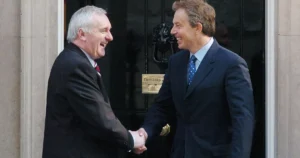Ireland, with its rich history and strategic geographical position, has always played a crucial role on the global stage. Its foreign policy is shaped by a myriad of historical, political, and economic factors. It reveals the delicate balancing act Dublin must perform to maintain harmonious relations with the European Union (EU), the United Kingdom (UK), and the wider world. This intricate dance not only highlights Ireland’s diplomatic agility but also underscores its commitment to safeguarding national interests while promoting global cooperation.
Navigating the European Union
Ireland’s relationship with the European Union is a cornerstone of its foreign policy. Joining the EU in 1973 marked a significant shift for Ireland, moving from a peripheral agrarian economy to an integral part of one of the world’s largest economic blocs. The EU membership has brought numerous benefits, including substantial financial aid, market access, and the fostering of political stability. Ireland has been a staunch supporter of the EU, advocating for deeper integration and cohesion among member states. This alliance has also enabled Ireland to punch above its weight on the global stage, using the EU as a platform to amplify its voice in international matters.
However, this relationship is not without its challenges. Ireland must often navigate complex negotiations and sometimes conflicting interests within the EU. For instance, the Common Agricultural Policy (CAP) has been a contentious issue, balancing the needs of Irish farmers with broader EU agricultural reforms. Moreover, the EU’s stance on corporate taxation has put Ireland under scrutiny, given its attractive tax regime that has drawn many multinational corporations to its shores. Despite these challenges, Ireland continues to champion the EU’s values and policies, viewing its membership as essential to its economic and political well-being.
The Intricate Ties with the United Kingdom
The historical, cultural, and economic ties between Ireland and the United Kingdom are deep and multifaceted. The two nations share a complex history that has shaped their contemporary relationship. The Good Friday Agreement of 1998, a landmark peace deal, significantly improved relations between the Republic of Ireland and Northern Ireland, fostering cooperation and reducing conflict. This agreement has been a cornerstone of Ireland’s foreign policy, emphasizing the importance of maintaining peace and stability on the island.
Brexit, however, introduced a new layer of complexity to Ireland-UK relations. The UK’s decision to leave the EU posed significant challenges, particularly concerning the border between Northern Ireland and the Republic of Ireland. The potential reintroduction of a hard border threatened the hard-won peace and the seamless economic integration enjoyed by both parts of Ireland. The resulting Northern Ireland Protocol, part of the Brexit withdrawal agreement, aimed to address these issues by keeping Northern Ireland aligned with certain EU regulations. Despite its intention to prevent a hard border, the Protocol has been a source of political tension and logistical complications. Ireland’s role in these negotiations underscores its diplomatic efforts to maintain stability and foster continued cooperation with the UK, even as it navigates the post-Brexit landscape.

Expanding Horizons: Ireland on the Global Stage
Beyond its relationships with the EU and the UK, Ireland has been actively expanding its global presence. This strategic diversification is crucial for a small nation aiming to enhance its influence and economic resilience. Ireland’s foreign policy has increasingly focused on building strong ties with other global powers, including the United States, China, and countries within the Commonwealth. The Irish diaspora, particularly in the United States, plays a significant role in shaping these international relationships. With millions of people of Irish descent living abroad, Ireland leverages these connections to strengthen diplomatic and economic ties.
Ireland’s commitment to international development and humanitarian aid further cements its reputation as a responsible global actor. Through initiatives such as Irish Aid, the country contributes to poverty alleviation, education, and sustainable development in some of the world’s most vulnerable regions. Ireland’s election to a non-permanent seat on the United Nations Security Council for the 2021-2022 term was a testament to its growing influence and dedication to global peace and security. This achievement highlighted Ireland’s proactive engagement in international affairs, reinforcing its role as a small but significant player on the world stage.
Conclusion
Ireland’s foreign policy is a testament to its ability to navigate a complex and ever-changing global landscape. Its relationships with the European Union and the United Kingdom are fundamental to its strategy, each presenting unique opportunities and challenges. Meanwhile, Ireland’s expanding global reach demonstrates its ambition to play a more prominent role in international affairs. Through a blend of diplomacy, economic strategy, and humanitarian efforts, Ireland continues to balance its national interests with its commitment to global cooperation and stability. As the world evolves, Ireland’s foreign policy will undoubtedly adapt, reflecting its enduring resilience and strategic acumen.



